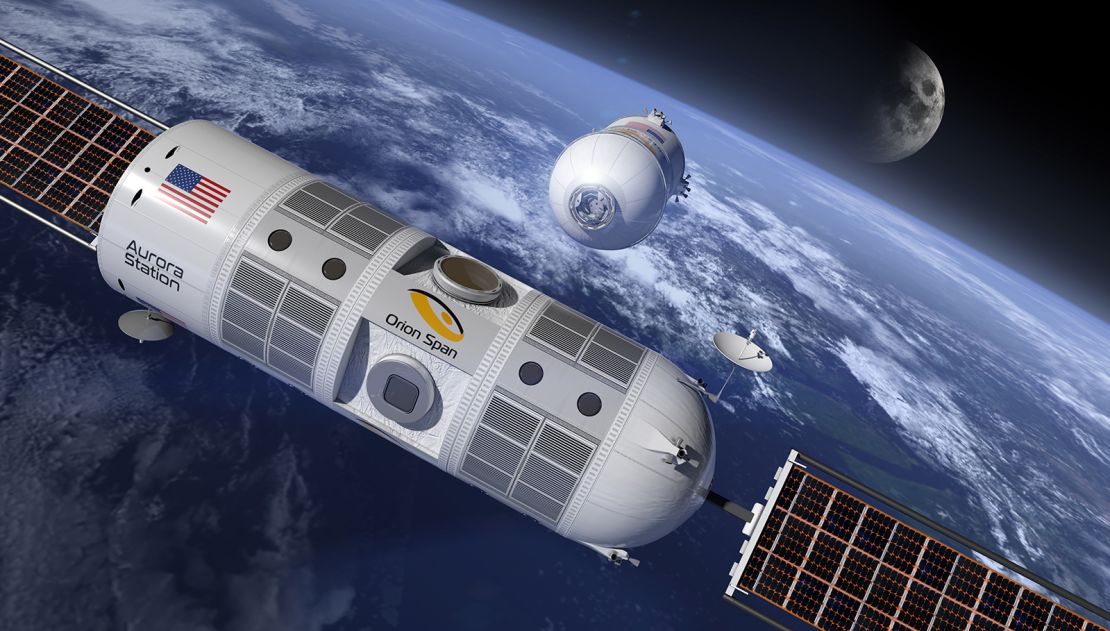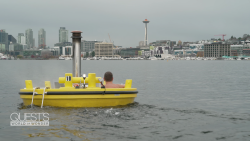Want to see 16 sunrises in one day? Float in zero gravity? Be one of the few to have gazed upon our home planet from space?
In just two years’ time, and for an astronomical $9.5 million dollars, it’s claimed you can.
Interior renderings of the world’s first luxury space hotel, Aurora Station, were unveiled Thursday for the first time.
Developed by US-based space technology start-up Orion Span, the fully modular space station will host six people at a time, including two crew members, for 12-day space travel tours.
It plans to welcome its first guests in 2022, with the station’s launch happening in 2021.
“Our goal is to make space accessible to all,” Frank Bunger, CEO and founder of Orion Span, said in a statement last year. “Upon launch, Aurora Station goes into service immediately, bringing travelers into space quickly and at a lower price point than ever seen before.”
Astronaut experience
While a $10 million trip is outside the budget of most people’s two-week vacations, Orion Span claims to offer an authentic astronaut experience.
Says Bunger, it has “taken what was historically a 24-month training regimen to prepare travelers to visit a space station and streamlined it to three months, at a fraction of the cost.”
See plans for the first luxury hotel in space
During their 12-day adventure, the super-rich travelers will fly at a height of 200 miles above the Earth’s surface in Low Earth Orbit, or LEP, where they will witness incredible views of the blue planet.
The hotel will orbit Earth every 90 minutes, which means guests will see around 16 sunrises and sunsets every 24 hours.
Hometown hero
Activities on board include taking part in research experiments such as growing food while in orbit – which guests can take home for a super-smug souvenir – and soaring over their hometown.
There’s also zero-gravity ping pong, complete with floating equipment.
Guests can have live video chats with their less-fortunate loved ones back home via high-speed wireless Internet access and, upon return to Earth, will be greeted with a specially arranged hero’s welcome.
While enjoying the thrills of zero gravity, the travelers will be able to float freely through the hotel, taking in views of the northern and southern aurora from the station’s windows.
Aurora Station will be around 12 feet wide and 35 feet long – similar in size to a large private jet.
“With customizable private sleeping pods, top-quality space food and luxury design details, Aurora Station is ushering in a new era of space travel, setting the bar higher than ever before,” says Bunger.
Guests will complete a three-month Orion Span Astronaut Certification (OSAC) program before take-off. Orion Span has a team of space industry veterans who together have more than 140 years of human space experience.
Orion Span is currently crowdfunding for investors who wish to own part of Aurora Station. At time of writing, there is $217,100 raised on its current SeedInvest campaign with fewer than eight days to go – which won’t make a huge dent in what is surely a very costly project.
Chartered trips

Orion Span isn’t the only venture boldly pushing the frontiers of elite travel into space.
Axiom Space, a Texas-based company with a former International Space Station manager at the helm, has plans to put a commercial space station in orbit by 2024.
It says it will begin to take tourists to the ISS in 2020 and later to its own station.
As yet, Axiom hasn’t priced its off-world excursions, but says it’ll be considerably lower than the tag paid by previous space tourists like Dennis Tito, who stumped up a reported $20 million for a seven-day trip in 2001.
Virgin Galactic, founded by Richard Branson with the aim of taking passengers briefly into sub-orbital space, will charge $250,000 for its trips. Flights were originally set to begin in 2009, but the maiden flight to space finally took place in December 2018.
Whatever the price tag, the tourist demographic with spare cash for space jaunts is presumably quite small.
However, Bunger says that Aurora Station “has multiple uses beyond serving as a hotel.”
It plans to offer fully chartered trips to space agencies and support zero gravity research and space manufacturing.
Adds Bunger: “Our architecture is such that we can easily add capacity, enabling us to grow with market demand.”
Orion Span’s next mission? To launch the world’s first condominiums in space.



























